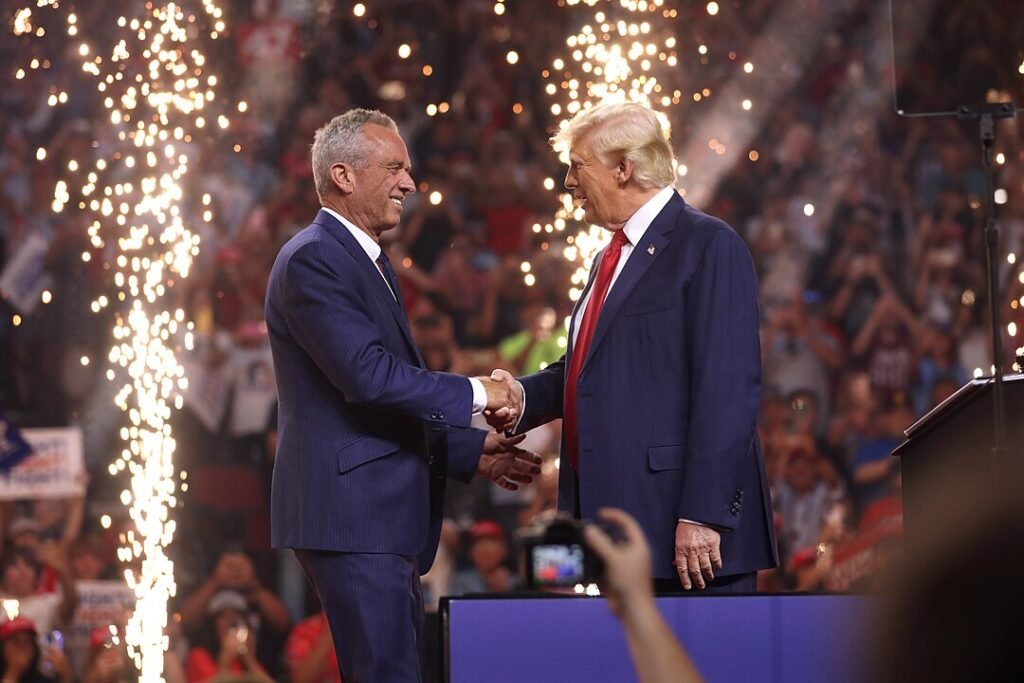Robert F Kennedy Jr., a longtime democrat, Greenpeace advocate and a presidential candidate for the democrats and then as an independent and then he would join the Trump MAGA campaign as a Republican. He’s controversial and innovative, and now he’s in charge of the MAHA, Make America Healthy Again, to educate Americans about healthier living, but his critics claim he’s destabilizing scientific integrity. Who is he, a Reformer who will help Americans be healthy again, or a madman destroying the health system? You decide.
A Shooting in 1968, a Mission 57 Years Long
On June 4, 1968, a 14‑year‑old Robert F. Kennedy Jr. paced the halls of Good Samaritan Hospital in Los Angeles. His father—Senator and presidential hopeful Robert F. Kennedy—lay mortally wounded after an assassin’s bullet. Bobby Jr. held vigil through the night, watching hope collapse into tragedy. That moment etched into him a lifelong tension between idealism and distrust.

In the decades since, Kennedy charted an extraordinary course: environmental champion, constitutional lawyer, and outspoken critic of mainstream medicine. After running for the Democratic nomination in 2024, he shifted to an independent bid before aligning with Donald Trump. Now, as Secretary of Health and Human Services, he presides over those same agencies—on a mission to reimagine America’s health institutions.
The Reformer’s Vision
Kennedy signalled his intent upon assuming office: “We will remake HHS—not to serve special interests, but to serve the true health of the American people.” He inaugurated the MAHA Commission, whose May report pinpointed ultraprocessed foods, environmental toxins, overprescription, and extensive vaccine schedules as key contributors to childhood chronic disease.

Though touted as data-rich and evidence-based, investigative outlets found at least seven citations that referenced nonexistent studies, along with numerous AI-generated entries flagged by tags like “oaicite.” Those errors prompted White House officials to attribute them to formatting issues and pledge corrections.
Complementing the report, Kennedy initiated sweeping job cuts—estimated at around 20,000 positions—across the CDC, FDA, and related agencies, merging departments into an entity dubbed the “Administration for a Healthy America.”
His most controversial act came in June: the abrupt dismissal of all 17 members of the CDC’s Advisory Committee on Immunization Practices (ACIP), replaced with eight newly appointed figures, several known for vaccine skepticism. Kennedy defended the decision as necessary to “restore public trust,” and the new panel soon moved to phase out thimerosal from flu vaccines.
Alarm Bells Over Public Health
Critics from both political parties voiced serious concern. Dr. Sean O’Leary of the American Academy of Pediatrics warned that Kennedy, despite claiming to restore vaccine confidence, “is, as an individual, more responsible for sowing distrust in vaccines than almost anyone I can name.”
Dr. Paul Offit similarly cautioned that a politicized ACIP poses a serious risk: “chaos and distrust” in what was once a trusted scientific process. Former committee members lamented that the abrupt dismissals had “left the U.S. vaccine program critically weakened,” warning of a “destabilizing disregard for scientific integrity.”
Experts also expressed concern that the move to exclude thimerosal could disrupt vaccine distribution, particularly overseas, where multi-dose vials remain essential. Meanwhile, the MAHA report’s fake citations sparked critiques about compromising scientific credibility at HHS.
An Uncertain Experiment
Vision
Kennedy reframes America’s health crisis not as a matter of infectious outbreaks, but as an epidemic of chronic disease—fueled by chemicals, processed food, stress, and pharmaceutical overreach.
Mechanics
Yet the tools he employs—mass layoffs, structural realignment, and questionable evidence—draw criticism as rash and opaque. Many experts insist true reform requires rigorous peer review, transparency, and deliberation—qualities many feel are currently absent.
Public Response
Public opinion is deeply divided. Rough polling places support near 30 percent—mostly conservative or anti‑pharma skeptics—while roughly 42 percent express disapproval, especially among Democrats and medical professionals concerned about vaccine hesitancy.
Amid these shifts, acting CDC Director Susan Monarez has stepped forward as a potential stabilizing force, vowing adherence to scientific protocol even as the agency undergoes upheaval.
Conclusion: A Fork in America’s Health Path
From holding his father’s hand in a hospital corridor in 1968 to steering the Department of Health and Human Services, Robert F. Kennedy Jr.’s trajectory embodies a collision of legacy, reform, and mistrust. His strategy—tilting health policy toward chronic illness, environmental factors, and institutional disruption—marks a sharp break from decades of public health orthodoxy.
As courtroom battles loom, scientific panels face an overhaul, and vaccination schedules are re-examined, the months ahead will determine whether Kennedy’s tenure ushers in a revitalized approach to public health—or becomes a cautionary tale about the politicization of science.
Sources
MAHA report & citation controversy
- Guardian: Seven cited studies do not exist en.wikipedia.org+10theguardian.com+10notus.org+10
- CBS/AP: MAHA cites seven nonexistent studies; White House says it will update theweek.com+8cbsnews.com+8pbs.org+8
- Wikipedia: Notes AI‑generated “oaicite” markers, phantom citations reuters.com+3en.wikipedia.org+3en.wikipedia.org+3
- Poynter: Highlights AI‑hallucinated references
- Washington Post, TheWeek: Reports on AI citation errors en.wikipedia.org
ACIP shake‑up & vaccine advisory panel
- Reuters: Fired all 17 ACIP members reuters.com+13reuters.com+13en.wikipedia.org+13
- Reuters: Named eight new, some vaccine‑skeptics time.com+3reuters.com+3reuters.com+3
- Reuters: New panel breaks norms, AAP boycott, and member withdrawal reuters.com+4reuters.com+4politico.com+4
- Reuters: Former members warn of immunity rollback
- Reuters: Panel votes to drop thimerosal from flu vaccines theguardian.com+3politico.com+3time.com+3
Policy shifts & public health impact
- Wikipedia: Kennedy’s chronic‑illness emphasis abcnews.go.com+4reuters.com+4reuters.com+4
- Reuters: Kidnapping staff and role of Monarez washingtonpost.com+1reuters.com+1
Expert voices & public reaction
- Reuters & Politico: Sean O’Leary, Offit, Frieden quotes on undermining trust
- Time & Reuters: Thimerosal vote procedural concern reuters.com+15time.com+15news.com.au+15
- Washington Post & The Daily Beast: Critiques on scientific integrity and chaotic communication thedailybeast.com


